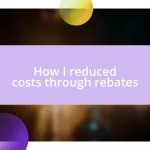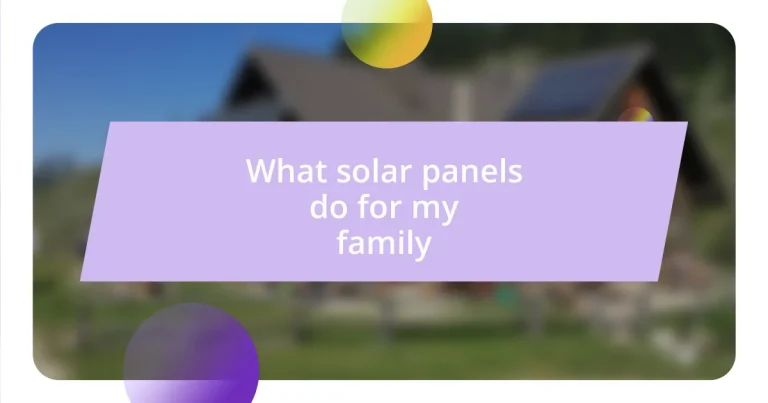Key takeaways:
- Installing solar panels significantly reduces electricity bills, often by 50% to 70%, while providing financial stability and the opportunity for tax incentives.
- Solar panels convert sunlight into usable electricity through a process involving photovoltaic cells and inverters, with the potential for excess energy storage or grid credits.
- Proper maintenance, including regular cleaning and monitoring, ensures optimal performance and longevity of solar panels, contributing to energy independence and environmental responsibility.

Benefits of solar panels
Imagine waking up every morning knowing that your home is powered by the sun. That’s exactly what my family experienced after we installed solar panels. It felt incredible to see a significant drop in our electricity bills—sometimes as much as 70%! Could you imagine what you could do with that extra money every month?
One of the most rewarding aspects of going solar is the peace of mind it brings. I remember the constant worry about fluctuating energy prices; it often felt out of my control. Now, with solar energy, I’ve gained independence from those market ups and downs. Doesn’t it feel good to know your energy source is both stable and sustainable?
There’s also an undeniable sense of pride in taking steps towards a cleaner planet. When friends visit and see our solar panels, they often ask about the experience, and I always relish the chance to share our journey. It’s not just about saving money; it’s about contributing to a better world for our children. How many choices can genuinely impact future generations like this?
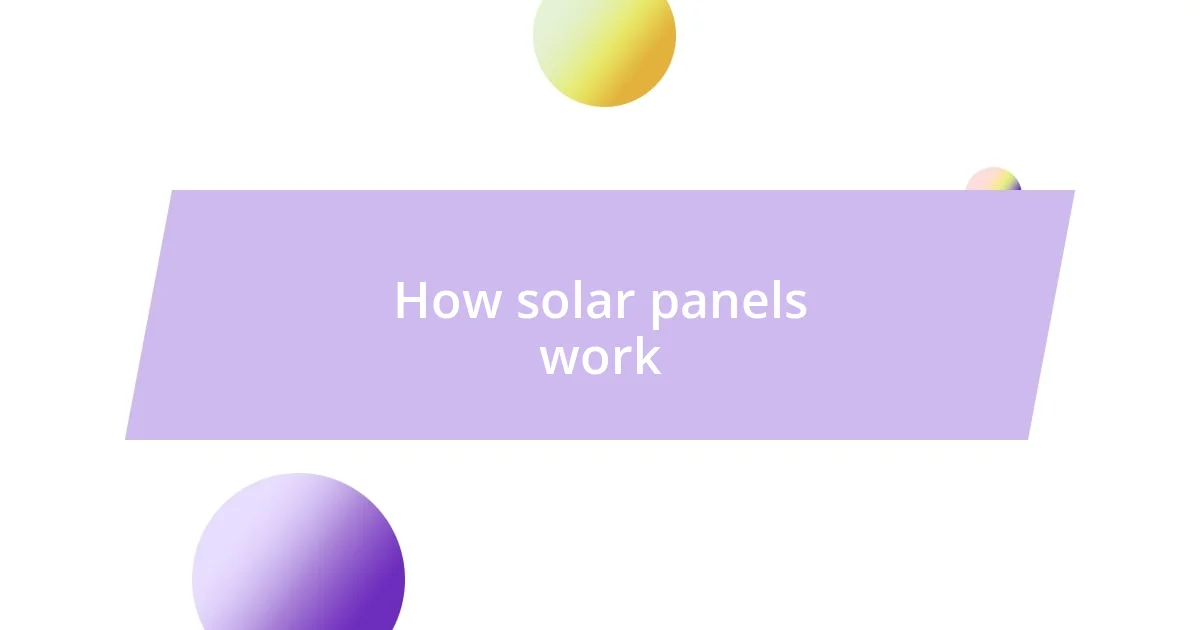
How solar panels work
When sunlight hits a solar panel, it’s an incredible transformation that occurs right before our eyes. The panel’s photovoltaic (PV) cells convert sunlight into direct current (DC) electricity. I still remember the first time I explained this to my kids; their faces lit up with wonder as they realized the sun could power our home.
After this DC electricity flows through an inverter, it gets converted to alternating current (AC) electricity, which is what our appliances run on. This step might sound technical, but it’s fascinating how efficiently solar panels can utilize sunlight. I was amazed to learn that a typical panel can produce between 250 to 400 watts of power on a sunny day, making such a difference in our daily routine.
Finally, any excess electricity generated can be stored in batteries or sent back to the grid, potentially earning credits on our electricity bill. On weekends, we’ve enjoyed the flexibility of using energy from the sun even when the day is winding down, and it creates a sense of reliability that’s hard to match—like the way I felt every time I brewed coffee in the morning knowing our solar panels were hard at work.
| Step | Description |
|---|---|
| Photovoltaic Effect | Solar panels convert sunlight into direct current (DC) electricity. |
| Inverter Function | DC electricity is converted to alternating current (AC), usable by home appliances. |
| Energy Storage or Return | Excess electricity can be stored in batteries or sent back to the grid. |
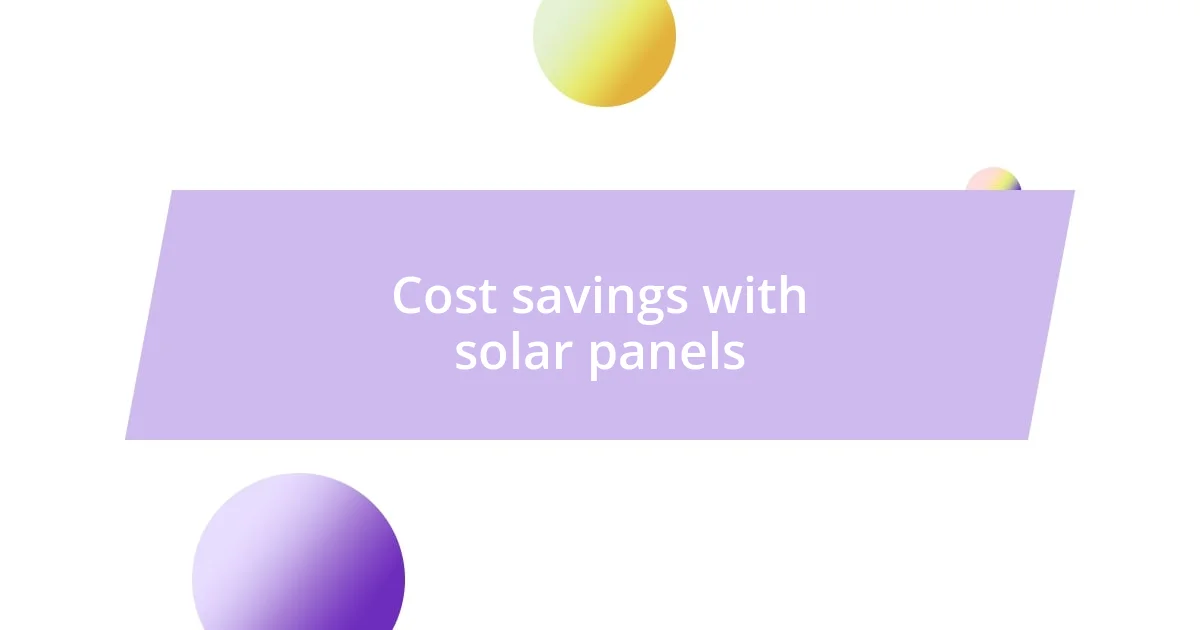
Cost savings with solar panels
The cost savings from solar panels can be quite remarkable. After installing ours, I was thrilled to see our monthly electricity bill drop significantly. It felt like a weight lifted off my shoulders, knowing that I was making a smarter financial choice. Honestly, those savings have allowed us to set aside money for family trips and other expenses we once struggled to manage.
Here are some specific ways solar panels can help your wallet:
- Lower Electricity Bills: Many families experience a reduction of 50% to 70% on their monthly electricity costs.
- Tax Incentives: In many regions, you can enjoy tax credits that significantly offset the initial investment.
- Increased Home Value: Homes with solar installations often sell for more, which can be a great benefit if you decide to move.
- Stable Energy Costs: With solar, you insulate your family from rising energy prices.
- Net Metering Credits: You can earn credit for excess energy fed back into the grid, further reducing your bills.
The satisfaction I felt when my first bill arrived post-installation was unforgettable. To see a concrete number that reflected our new lifestyle made all the planning worth it. I know that every little bit of savings contributes to a brighter future for my family and helps us achieve both our financial and environmental goals.
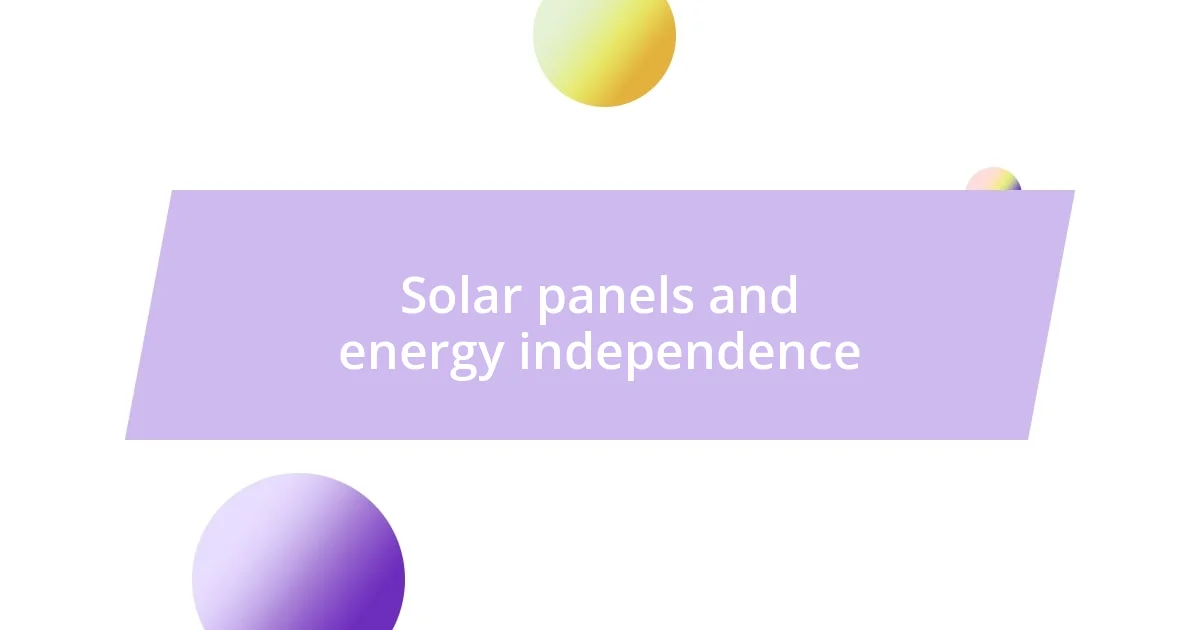
Solar panels and energy independence
There’s a certain feeling of empowerment that comes with installing solar panels—like reclaiming a little piece of the energy independence we all crave. I’ll never forget the day our installation was complete; standing on our porch, I looked out at the panels glimmering in the sunlight, and I felt a mix of pride and excitement. Isn’t it inspiring to think that we could generate our own power right from our home? This shift not only reduces our dependence on utility companies—it gives us control over our energy future.
When I consider the impact of those panels, I think of my family’s resilience in the face of rising energy prices. With solar energy, we are no longer at the mercy of fluctuating utility rates. Instead, by generating our own electricity, I feel a sense of security knowing that our energy costs can remain stable. The freedom that comes from using energy that we produce ourselves is something I truly cherish.
I often find myself discussing energy independence with friends, sharing the sense of accomplishment that comes from knowing we’re doing our part for the environment and our household budget. It’s exciting to be part of a community that embraces renewable energy; it feels like we’re building a brighter, more sustainable future together. Isn’t it time for all families to consider taking that leap toward independence?
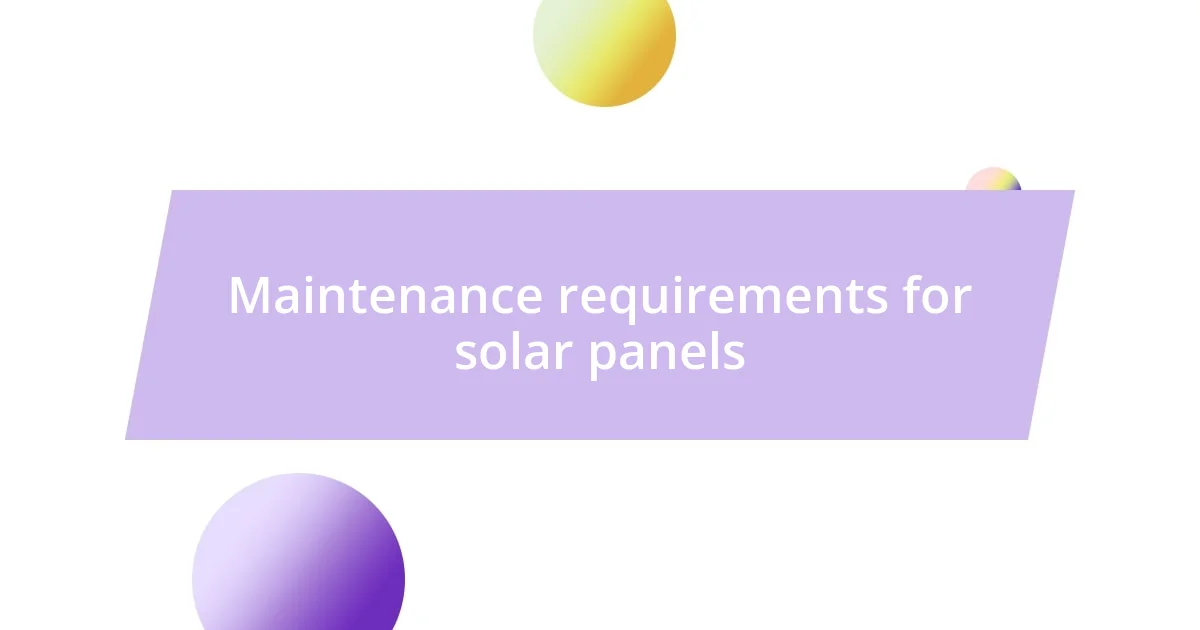
Maintenance requirements for solar panels
Maintenance is an important aspect of owning solar panels, but thankfully, it tends to be straightforward. Personally, I’ve found that just a few key maintenance tasks keep my system running efficiently. Regular cleaning of the panels—especially after storms or heavy pollen seasons—has made a noticeable difference in energy production. I simply use a hose to wash off any dust or debris. It feels good to know I’m helping my panels operate at peak performance with such a simple task.
Another maintenance requirement to keep in mind is inspecting the surrounding area. I often check that trees or structures aren’t casting shadows on the panels, which can impact efficiency. Did you know that even small amounts of shade can reduce energy output significantly? This was a lesson I learned quickly as my panels sometimes produced less than expected. Taking proactive measures to trim back any obstructions has truly paid off.
Don’t forget to monitor your system’s performance regularly. I set reminders to check the monitoring app that came with my installation. When I notice anything out of the ordinary, I can quickly contact our installer for assistance. Hasn’t it been reassuring to have that level of control over my energy system? In my experience, staying on top of maintenance not only helps keep the panels efficient but also extends their lifespan, securing my family’s investment for years to come.
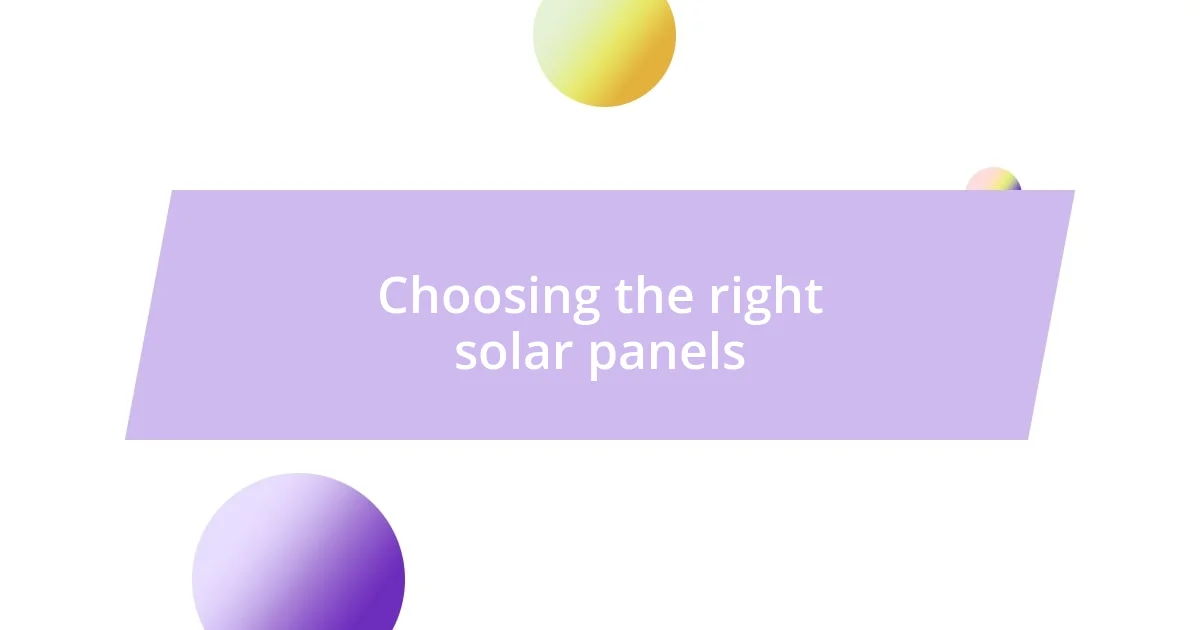
Choosing the right solar panels
Choosing the right solar panels can feel a bit overwhelming at first, but it’s genuinely an exciting journey. When I was selecting panels for my home, I knew I needed to consider factors like efficiency and warranty options. What if I told you that the right choice could potentially save you thousands on energy bills? I remember standing in the installer’s office, looking at the efficiency ratings, realizing how much a small percentage difference could mean for my family in the long run.
In my search, I also learned about different types of solar panels available on the market. Monocrystalline panels caught my eye because of their sleek design and high efficiency, especially when space is at a premium like in my case. I couldn’t help but feel a sense of purpose in choosing a product that not only looked great on my roof but also maximized our energy output. It felt empowering to know I was making a decision that would benefit my family’s environment and finances for years to come.
Finally, don’t underestimate the importance of choosing a reputable installer. I remember the peace of mind I felt when I found an installer who took the time to explain the entire process, from panel selection to installation. They really cared about matching my needs with the right technology. Have you thought about who might guide you in selecting the best panels for your family? With the right partner, you too can embark on a rewarding path to sustainability and energy independence.










